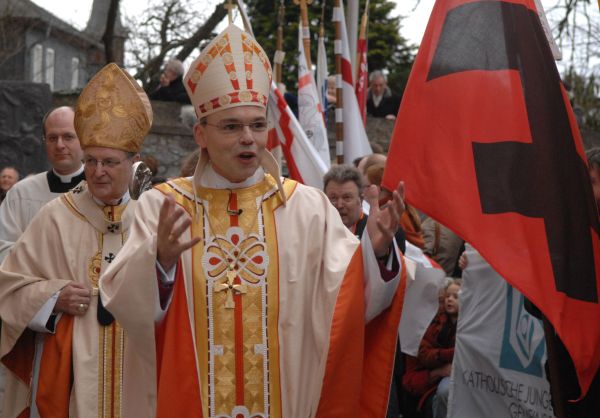
Last week, the extravagant spending of a German Catholic bishop made headlines as he was summoned to the Vatican to discuss his lavish lifestyle. Bishop Franz-Peter Tebartz-van Elst from the diocese of Limburg, allegedly spent over €31 million (£26 million) on renovating his official residence – an expenditure that does not fit well in Germany’s financial climate, nor Pope Francis’ calls for priests to live frugally. Tebart-van Elst, who has been dubbed as the “bling bishop” in the German media, is also accused of lying under oath about his other expenses. The Bishop sued the German newspaper Der Spiegel over false accusations, when it claimed that Tebartz-van Elst and his assistant had flown first class to India in 2012. The Bishop stated that he was never asked this question in the interview, but is now facing penalties for submitting false affidavits, as Der Spiegel published a video of the bishop's interview in which he tells that on this trip – to participate in an aid project for poverty alleviation – he flew business but was upgraded to first.
How did Bishop Tebartz-van Elst’s fund his excessive habits? The German Catholic dioceses have a reserve called the “bishop's chair,” the value of which is only known to the bishop and his advisors. This secret “nest egg” is not reported in the diocese’s annual balance sheets, nor is it taxed. The amount that is available to a bishop varies, but it seems that the “bishop’s chair” in Limburg could have easily covered Tebartz-van Elst’s home improvement projects: The controversy has made some dioceses eager to shed a light on their holdings, with the Cologne diocese for example reporting that its bishop has access to €166.2 million (£140 million). Cologne’s Cathedral Provost Rev Norbert Feldhoff told a German Church radio program: "There are big sums and there are problems. We can explain it all to experts, but it could be difficult for the average housewife in Cologne to understand."
For the recession-hit German churchgoer, the ability of the bishops to explain their riches might be of little consolation in any case. Petitions for the removal of Tebart-van Elst have appeared, and the Limburg diocese has experienced a rise in the numbers of people leaving the Church. But, what Tebart-van Elst and other bishops with bling-aspirations probably fear more than the disapproval of their flocks is facing the fury of the pontiff himself. As Pope Francis has on several occasion emphasised his dislike on all things flashy, and stated that the Catholic Church should be a “Church of the poor”, Tebart-van Elst has good reason to worry that his case may force Francis to set him as an example of what the new Pope allows in his Church. Only the Pope can formally remove a bishop from his post, and Tebart-van Elst’s actions and subsequent unpopularity should be plenty of reason for his boss to consider the bling bishop’s time in the cloth over. Indeed, before meeting with Tebart-van Elst yesterday, the Pope gave a sermon in which he condemned greed: “Take care to guard against all greed, for though one may be rich, one's life does not consist of possessions," Francis said. No news have yet emerged on the result of the meeting of the pontiff and the bishop.
Not only has the expenditure debacle brought the Catholic clergy’s spending habits under the public’s (and the Pope’s) watchful eye, but it has also reignited the debate over the Church’s membership tax. In Germany, the Catholic Church mandates its members to pay a fee collected by the state, which amounts to 8-9% of the income tax. Last year, after a challenge from a retired law professor - who argued that Church membership depends on faith, not on financial agreement - a court in Germany ruled that the Church had the right to deny non-paying members Catholic rites. The luxury bishop’s extravagance now seems like a mockery of the taxpayers who are struggling in the current economy, but are obligated to pay the Church to address their spiritual needs. Moreover, the attempts of some dioceses to “save face” by revealing their actual wealth should make even the most fervent worshiper question if the Church really needs the extra 5 billion Euros (£4bn) it collects from its members. All in all, the German Catholic Church is still far from Pope Francis’ ideal Church of the poor.

